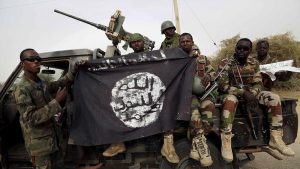Highlighting the dangers posed by terrorism in Africa’s sub-Saharan Sahel region, African leaders mounted the podium of the United Nations General Assembly today to appeal for the resources needed to make the multinational force set up to counter the scourge fully operational.
“Owing to the gravity of the situation, we must take advantage of the Secretary-General’s follow-up report to reinforce the joint multinational force’s mandate by providing it with the resources it needs to succeed in its mission,” Burkina Faso’s President Roch Marc Christian Kaboré said.
In June the UN Security Council endorsed the formation the G5 Sahel joint force, comprising Burkina Faso, Chad, Mali, Mauritania and Niger, to combat terrorism and transnational organized crime in the restive region.
“One of the major challenges is the mobilization of resources,” he said, noting that the northern regions of both his own country and neighbouring Mali have been affected by terrorism and extremism and need an urgent investment programme to lessen the vulnerability of the people living there, especially women and the young.
“The struggle against terrorism can only succeed if it is based not only on a sub-regional approach but also on the dynamic of economic development for the most vulnerable areas,” he explained.
Gabon’s President Ali Bongo Ondimba lauded the establishment of the G5 Sahel force. “It is a question of multi-dimensional long-term battle which demands inter-State cooperation and solidarity with the victims of the atrocities,” he told the Assembly.
His own country is part of a subregional anti-terrorist initiative by central African States “to combat the terrorist hydra in all its forms and whatever its motivation.”
He stressed that a military response had to be accompanied by other measures, including action to reduce the funds flowing to criminal organizations.
Mr. Ondimba also called for determined action against poaching that is decimating Africa’s fauna and flora, and its natural resources.
Comoros President Azali Assoumani called terrorism “his absolute negation of what is human [which] has become a scourge that we condemn and must fight together without mercy and on a planetary scale with all our forces.”
Decrying the association of terrorism with Islam, he said there was no Islamic terrorism, just as there is no Christian or Jewish terrorism. “Terrorists are simply barbarians,” he stressed.
“We condemn without reserve the atrocities perpetrated against minorities and communities, yesterday in Bosnia and Herzegovina, and today in Burma (Myanmar) against the Rohingya and other minorities wherever they are, whose inhuman and savage victimization is all the more shocking in that its extreme violence is directed towards the ethnic cleansing of those who have the least resources.
“I dare to hope that our Organization will know how to defend the most elementary rights of the oppressed, regardless of origin, race, sex, or belief,” he added.
The leaders also addressed a host of world issues, from climate change to the Democratic People’s Republic of Korea’s (DPRK) nuclear programme, and from the need for expansion of the 15-member UN Security Council with permanent African representation to achieving the Sustainable Development Goals (SDGs) that seek to haul hundreds of millions of people out of poverty, hunger and social ills by 2030.
President Teodoro Obiang Nguema Mbasogo of Equatorial Guinea said his own country had suffered terrorism, piracy and attempted attacks from outside seeking to undermine its “peaceful and democratic system of Government, disrupt peace and stir up revolts for the benefit of fortune-seeking adventurers.”
This had led to unjust and gratuitous accusations against the country’s leaders.
He cited a whole litany of obstacles from international terrorism, extremism, xenophobia, and human trafficking to piracy, mercenary attacks, trans-border crimes and the economic crisis confronting the whole world.
“All these phenomena make it necessary to awaken a greater awareness among nations, and to promote a more direct inter-State cooperation, and undertake a dynamic and coordinated action by all nations in solidarity,” he declared.



